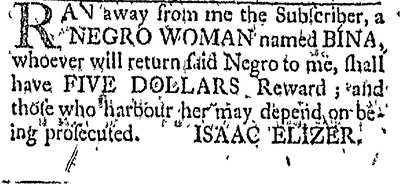
Newport, Rhode Island in the mid-18th century embodied two marked ironies. Settled a century earlier on the principles of religious freedom and civil liberties, the fledging colony would attract many of the world’s most persecuted religious minority groups including Quakers, Baptist, and Jews. These same religious minorities would also enjoy the vast economic prosperity of trading and owning enslaved Africans. Between 1705 and 1805, Rhode Island merchants, largely from Newport, would sponsor nearly 1,000 slaving voyages to West Africa carrying back nearly 100,000 enslaved Africans to America and the West Indies. By 1755, Newport was a leading slave port in the American colonies.
One of the most persecuted of religious minorities were Sephardic Jews who had fled the Iberian Peninsula after the Edit of Expulsion of 1492 by King Ferdinand and Queen Isabella of Spain. The Edit declared that no Jews were permitted to remain within the Spanish kingdom, and Jews who wished to convert to Christianity were welcome to remain. The subsequent Jewish Diaspora ran concurrent with the African Diaspora as both groups followed similar routes to the New World settling in places like Brazil, Barbados, Jamaica, New Amsterdam (New York) and Newport, Rhode Island.
Rhode Island’s Royal Charter dated July 8, 1663 would uniquely guarantee a “freedom of religious concernments†for all its citizens of the Protestant, Christian faith. In 1762, prominent Jewish merchants Aaron Lopez and Isaac Elizer of Newport petitioned to become naturalized citizens within the Colony of Rhode Island at Newport, but were turned down not once, but twice by the Rhode Island Superior Court with the rationale stating “Further by the charter granted to this colony it appears that the free and quiet enjoyment of the Christian religion and a desire of the propagating the same were the principal views with which this colony was settled, and by law made and passed in the year 1663, no person who does not profess the Christian religion can be admitted free that is, as a voter or office holder to this colony.†Both men, despite their wealth and contributions to Newport and Rhode Island’s highly flourishing maritime economy would be denied citizenship simply because of their religious beliefs. Lopez and Elizer’s prosperity as merchants in 18th century Newport included participation in the Trans-Atlantic Trade, transporting goods and products between Newport, West Africa, and West Indies and back to Newport. Their trading activities included human cargo and both men owned enslaved Africans as part of their Newport homes and businesses.
On May 18, 1769 Isaac Elizer posted an advertisement in the Newport Mercury newspaper offering a reward for the return of his runaway slave woman, Bina. There is no extant historical evidence of who Bina was, however, “Bina†may very well be the Anglicized or phonetic version of the day name “Abena,†the Akan name for girls born on Tuesday. The Akan people of the Gold Coast (Ghana today) would frequently name their children for the day of the week or the order of their birth. Many of the enslaved Africans that would come to 18th century Newport would originate from the Gold and Windward Coasts of West Africa, and many would retain or revert back to their African day names. Historical record does not tell us if Bina was captured and returned to Elizer, or if he was a kind or cruel master. What we do know is that, like her master’s people who fled from religious persecution to freedom, she ran from enslavement to freedom.
We know that an African woman named Bina (Abena) exercised her one avenue for self-determination and freedom by running away from her owner. We also know that many enslaved Africans were far from the historical stereotypes of being content and docile in their captivity. Historical records are replete with examples of Africans escaping their captivity and fleeing anywhere and everywhere there was a chance for personal freedom.
World history is filled with examples of one group of people being less than humane towards the next based upon religious, racial, ethnic and class differences. Possibly the greatest tragedy of discrimination and persecution is that it has been an equal opportunity employer of us all at one time or another in the history of the world. And the greatest historical irony for Isaac Elizer and Bina was that one unjust law would restrict him from becoming a full citizen, yet he would apply and benefit from another unjust law that places other humans into servitude.
- Beginnings of the Back to Africa Movement - January 16, 2015
- TO BE SOLD: African Slave Advertisements in Colonial Newport - December 4, 2014
- In The Name of History - July 16, 2014




Thank you for sharing!
Amazing story! It reminds me of my 4x great- grandmother, ” VINA”, whomy family’s oral account said her last name was COLLIER. No proof of her having a last name. Curiously, there is a VINA found on the INWARD SLAVE MANESTS,on a ship named, ANN.The ship left Charleston, SC, arrived in New Orleans on 23 July 1822. Shipper/ Owner was Robert Boyce. Vina was 10 years old in 1822. I check with historical societies and the origin seemsa farced
Kathleen Brandt of the Midwest Genealogy Center, gave me a free clue, snd said maybe the real origin is Virginia or like the story,RHONE ISLAND. MY SEARCH CONTINUES……
Great story!
Let us know how your research goes. Thanks for the mention, and be sure to keep an eye on the blog.a3genealogy.com for more tips! 🙂
Rhode Island and Charleston, SC were close trading partners during the 18th century. Rhode Island slave ships would transport enslaved Africans directly to Charleston, many originating from Sierra Leone. Newport slave ship owners with strong Charleston connections include Lopez, Vernon and Lucena.